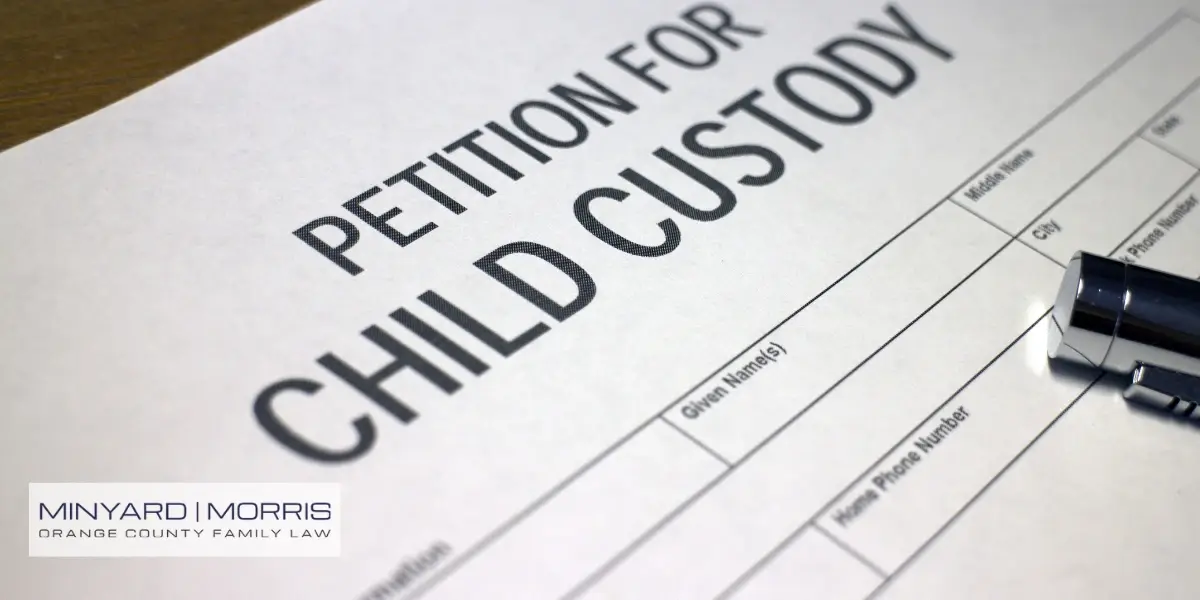|
|
Last
Modified on
Apr 30, 2025
How to file for child custody in California is one of the most important questions parents face when separating or preparing for divorce. Submitting necessary paperwork is only one part of the process; you must also understand your legal rights, the court’s requirements, and what will benefit the child.
California courts focus on maintaining stability and safety while evaluating parental roles, so thorough preparation becomes essential. Before taking your next steps, you must be familiar with the processes of seeking legal custody, physical custody, or both.
Understand the Types of Custody in California
It is essential to understand legal and physical custody before filing a custody petition. Legal custody involves granting a parent the authority to decide key aspects of their child’s healthcare, educational path, and general well-being. Physical custody determines both the child’s residence and the division of their time between parents.
In 2022, 80% of the 10.9 million one-parent American family groups with minor children were single-mother households. Parents can receive a joint custody agreement (shared between both parents) or a sole custody award, depending on the child’s best interests..
The legal system supports custody decisions that prioritize children’s welfare and usually presume joint custody arrangements to be beneficial unless evidence shows that one parent lacks the necessary capacity to care for their child.
The first step in filing for custody involves determining which type of custody agreement you require so you can anticipate the court’s approach to your situation.
File the Required Forms With the Court
You must complete and submit Form FL-300 (Request for Order) to your local Superior Court to initiate the process. Through this form, you can seek child custody or visitation decisions during an ongoing family law case. A new case must be established through either a Petition for Custody and Support, using Form FL-260, or a Petition for Dissolution with Form FL-100, based on your specific circumstances.
In Orange County, child custody matters are typically filed at the Lamoreaux Justice Center in Orange, which serves as the main family law courthouse. After submission, the court will schedule a hearing. You are also required to serve the other parent with copies of the filed documents using legally approved methods.
Prepare for the Court’s Custody Evaluation Process
Filing a custody request may lead to a court mandate for both parents to participate in mediation, as it stands as a compulsory procedure in most counties throughout California. The objective of this session is to guide parents toward reaching an agreement outside of court. Should parents fail to reach an agreement during mediation, the case moves to a hearing, in which a judge reviews how each parent can offer a stable and secure environment for the child.
The court examines factors including the work schedules of both parents, their caregiving records, any previous abuse or neglect events, and the educational and emotional requirements of the child. When allegations of parental unfitness arise, a child custody evaluator may assess each parent’s home environment and caregiving abilities.
Follow the Judge’s Orders and Prepare for Modifications
The judge will issue a custody order after the hearing, which must be followed exactly according to its written terms. Legal repercussions for violating a custody order include fines or loss of parenting time. Contempt penalties may come about if abduction or other criminal acts are involved. A request for modification can be initiated by either parent if there are significant changes such as relocation, new work hours, or safety worries about the child.
To receive a custody modification, both parents need to demonstrate that significant circumstances have changed. The existing custody order remains enforceable until the court issues a new ruling to replace it. Following the custody order and recording any issues maintains your legal rights for later custody-related cases.

FAQs About Filing for Child Custody in California
Do I Need a Lawyer to File for Child Custody in California?
Legal advice is beneficial because custody cases present complex challenges when individuals file without an attorney. Legal representation ensures that your documents are filed correctly and your rights remain protected while your case receives proper documentation. Professional representation becomes essential when your case involves contested custody or questions about the other parent’s behavior, especially when relocation is also involved.
What Is the Difference Between Legal and Physical Custody?
Legal custody grants the authority to make major decisions concerning the child’s educational path as well as their health and overall well-being. Physical custody establishes both the child’s living arrangements and the distribution of time between parents. The court may award both custody types either together or separately based on the child’s best interest.
How Long Does It Take to Get a Custody Order in California?
Timeline lengths depend on the specific county jurisdiction, along with available court resources and the contested status of the custody case. Temporary orders are usually granted within several weeks after filing, but permanent orders require several months to establish. Trial cases and those needing evaluations usually require more time to reach a resolution.
What Happens if the Other Parent Doesn’t Follow the Custody Order?
The court can enforce a custody order if your co-parent fails to comply. You could file a contempt motion or request a modification in response to this situation. Courts respond with seriousness to custody order violations that threaten a child’s safety or well-being. Documentation of every occurrence, alongside adherence to legal protocols, remains essential for resolving the matter.
Contact Minyard Morris
Achieving child custody in California demands more than form submission because it necessitates strategic preparation alongside meticulous legal comprehension. Parents must approach custody requests with meticulous attention to detail and prioritize the child’s best interests regardless of whether it’s part of a divorce or a separate action.
Minyard Morris delivers skilled trial-ready representation for parents who need support to protect their legal rights and achieve positive custody results. Our attorneys handle every case using clear strategies and precise methods, whether you need to obtain custody for the first time or make a custody modification request. Reach out to Minyard Morris now to explore your custody objectives and obtain personalized advice based on your specific legal requirements.






